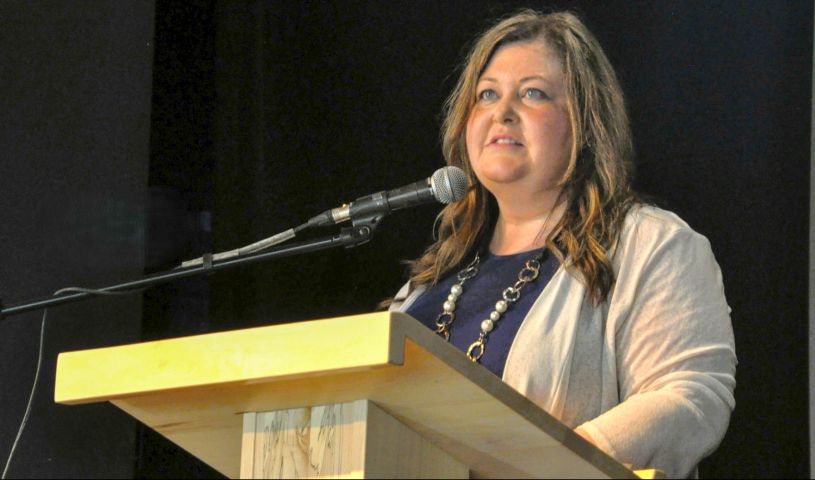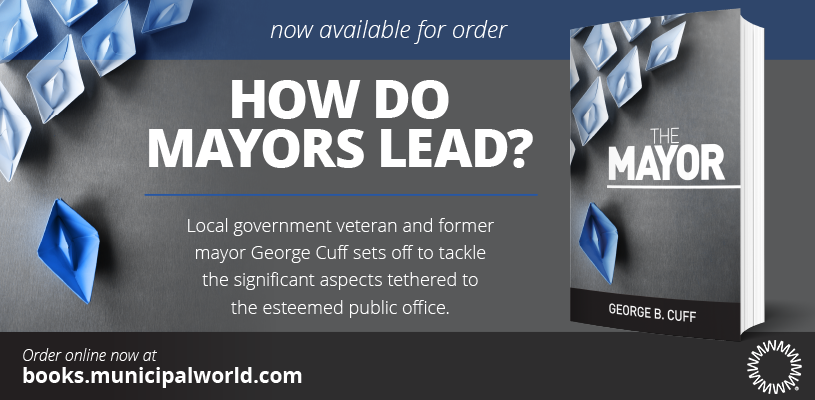Christa Lowry: Celebrating leadership, advocacy, and the privilege of public service
 Christa Lowry, now a decade into her local government career and serving a second term as mayor of Mississippi Mills, Ont., has been recognized with an honourable mention in Municipal World’s 2025 Women of Influence in Local Government Award. Photo: Mississippi Mills
Christa Lowry, now a decade into her local government career and serving a second term as mayor of Mississippi Mills, Ont., has been recognized with an honourable mention in Municipal World’s 2025 Women of Influence in Local Government Award. Photo: Mississippi Mills
2025 Women of Influence in Local Government Award Honourable Mention
Now a decade into her local government career and serving a second term as mayor of Mississippi Mills, Ont., Christa Lowry has been inspired by – and worked alongside – some remarkable women. Still, she was surprised to be named an honourable mention in Municipal World’s 2025 Women of Influence in Local Government Award.
Lowry was named as an honourable mention alongside Randy Goulden, a councillor in Yorkton, Sask. The honouree for 2025 is Lisa Pastro, director of operations for Westbank First Nation, in southern British Columbia.
Lowry called the recognition “incredibly humbling” and meaningful, given the distinguished group of past honourees.
“I wasn’t anticipating this whatsoever and just being recognized as one of the 56 nominations is just incredibly meaningful, particularly when I think about the many inspiring women who have been honoured with this recognition in the past,” Lowry said. “I think of (past honourees) Wendy Landry and Lynn Dollin and Rowena Santos … Pat Vanini – it’s a who’s who of women who are really making impactful change.”
Importance of Recognition
While feeling an immense sense of pride for her designation, Lowry is quick to acknowledge that recognition is not something she – or a lot of other women – seek out in their work. Instead, such recognition is important for representation and inspiring other women and young girls.
Whether it’s in politics, on the staff side, or something adjacent to the municipal landscape, Lowry maintains it is essential for women to see other women in leadership roles.
“Anyone who gets recognized, it’s not the recognition you’re after. But if you can look past that, there’s a real importance to having women, having young women, having young girls, see women leading and just opening those doors – opening those possibilities of what can be – rather than thinking of what can’t be.”
Challenges of Gender-Based Criticism
Lowry has faced plenty of gender-based criticism as a woman in public leadership, including comments on her appearance, tone, and likability, that her male colleagues simply never encounter. As such, she has had to work to ensure her voice is heard and understood.
She noted that women too often face this situation. Besides the comments on appearance, tone, and likability, she also gets interrupted more often than her male colleagues. That said, she is at a point in her life when she is unabashed about calling it out. She always tries to remain respectful about it, but she’ll still call it out.
In Mississippi Mills, Lowry finds herself on a council where five of the seven members are women – something she acknowledges is “pretty rare.” Lowry emphasizes the respect and support that she feels from all her colleagues – women and men – at her own council table. In other settings, however, she is often the only woman present.
These scenarios require her to project herself clearly to be heard and understood. But she acknowledged that sometimes it is impossible to influence the discussion, and in those moments she focuses her energy elsewhere.
“There are places where you realize this is not the place that I’m going to be able to make a shift or a contribution,” Lowry said. “And so, you focus on the places where you really can. And it’s uncomfortable. Politics is pretty uncomfortable.”
Progress, And a Lack Thereof
Lowry has been active in politics for about 11 years. Over that time, she has seen progress made around women’s representation in local government. But she notes the discourse and scrutiny faced by women, particularly those who are racialized or gender diverse, has become more difficult in recent years.
Lowry recalls she was about 34 when she first started watching local council meetings. This was after having moved back to the community she grew up in.
Lowry recalls there was only one woman on what was then a council of 11 people. Everyone was “of an age of experience” where most had completed their careers and were facing retirement or were in retirement.
The reality of that situation is she didn’t see herself or her interests being reflected by the council of the day.
Times have changed – as she points back to her own council with five of seven members being women. But also, many of the town’s senior management team are also women.
As such, Lowry acknowledges there are opportunities for women that maybe weren’t there 10 or 15 years ago. There are also more women standing up to take on leadership roles so that women today can see themselves reflected in spaces where she didn’t necessarily see herself reflected a dozen years ago.
But there are lots of places where it’s getting more difficult.
“I think in one way things are getting better and in another it’s getting far worse,” she said. “It really takes all of us standing up and calling on our best selves and trying to find ways to support each other. And, in some ways, it’s a matter of calling out some of these things that happen.”
Value of Public Service
Despite the challenges and obstacles that women face in politics today, Lowry remains a passionate supporter of public service. Whenever someone asks whether they should consider running for office or working in the sector, Lowry answers with an unequivocal yes.
Lowry said that if any woman – or any person – reaches a point where they want to take on a new challenge and truly feel that public service is the right path, she will always encourage them.
But she will tell them to make the choice “with your eyes open.” People need to know when to ask for help, Lowry said. They also need to set boundaries and to know when things aren’t personal. They also need to understand there is a toll and a weight to making decisions.
Whether it’s as a member of council or as a leader in another capacity in another organization, there’s always weight to those decisions.
“Who is it that’s in your corner when you need to talk through something or when things are not going the way that you’re hoping for them,” Lowry said. “Know the road isn’t easy. Having those colleagues and having those folks that you know you can lean on when things are good and when things aren’t so good – it’s really important to have that support.”
Setting Boundaries
Lowry said it is essential to set personal boundaries and find ways to balance the relentlessness of politics. This includes leaning on her key supporters but also finding outlets unrelated to her work to recharge.
The importance of boundaries is reflected in something as simple as a trip to the hardware store.
Lowry recently stopped in at a local hardware store on a Saturday to pick up a single item. But by the time she left the store, 75 minutes had come and gone as she became involved in numerous conversations with residents.
While that might sound problematic to some, Lowry said it is simply the reality of her position. And so, maybe she doesn’t go to the hardware store, or the grocery store, on a Saturday afternoon. Maybe she goes shopping after work during the week.
Lowry said she has had to adapt her routines, especially during busy weeks.
“The thing I always come back to is I’m fortunate that there were seven people who wanted to chat with me and wanted to share something with me or wanted to ask a question or whatever it was,” Lowry said. “I’m fortunate that they want to have that conversation with me, because it means I’m doing something right. There aren’t many roles where you get to be part of people’s lives in that way.” MW
✯ Municipal World Executive and Essentials Plus Members: You might also be interested in the 2024 Local Government Award honourees: Recognizing key figures in local government.
Sean Meyer is digital content editor for Municipal World.
Related resource materials:



